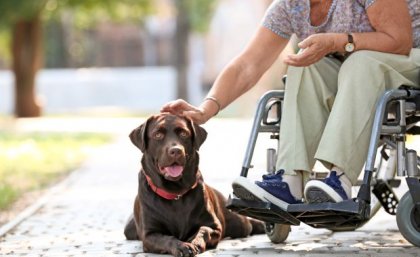
University of Queensland research has revealed a need for better protection for assistance animals and support for their owners facing financial hardship or moving into aged care.
PhD candidate and lead researcher Amanda Salmon from UQ’s School of Psychology said while there were numerous laws protecting people living with disabilities, the study found there was not the same level of support for their assistance animals.
“We found in some circumstances people were faced with the hard decision of rehoming their assistance animal because they could not afford food, veterinary care or training costs,” Ms Salmon said.
“Other people had to give up their animals when moving into rental housing or aged care due to restrictions on having pets.
“These hard decisions not only impact the quality of life of the owner, but the assistance animal can be left confused and distressed.
“More needs to be done to ensure people have the necessary means to provide basic care for their assistance animals and red tape needs to be removed around housing and aged care applications so they can stay together.”
A report by the Animal Welfare League Australia found that of 2,933 aged care facilities reviewed, only 18 per cent considered allowing residents to keep an animal.
The UQ research highlighted that in some circumstances owners were able to return the assistance animal to the providing organisation, but other animals had to be relinquished to a shelter if it had been self-trained by the owner and a suitable friend or family member couldn’t adopt it.
Assistance animals increase the quality of life for people with various physical, sensory, cognitive and emotional needs.
Professor Nancy Pachana, Director of UQ’s Healthy Ageing Initiative, said it was important that assistance animals were given every opportunity to remain with their owners, especially those who were older.
“Assistance animals create a sense of companionship, reduce social isolation and have both mental and physical health benefits,” Professor Pachana said.
“Imagine going through significant, compounding losses in downsizing, moving into a new home and then on top of that, finding out you cannot keep your companion who may grant you independence.
“There should be greater recognition of this in assisted housing situations aimed at older people.”
The full research is in Animals.
Media: UQ Communications; Bridget Druery, b.druery@uq.edu.au, (+61) 435 221 246.


